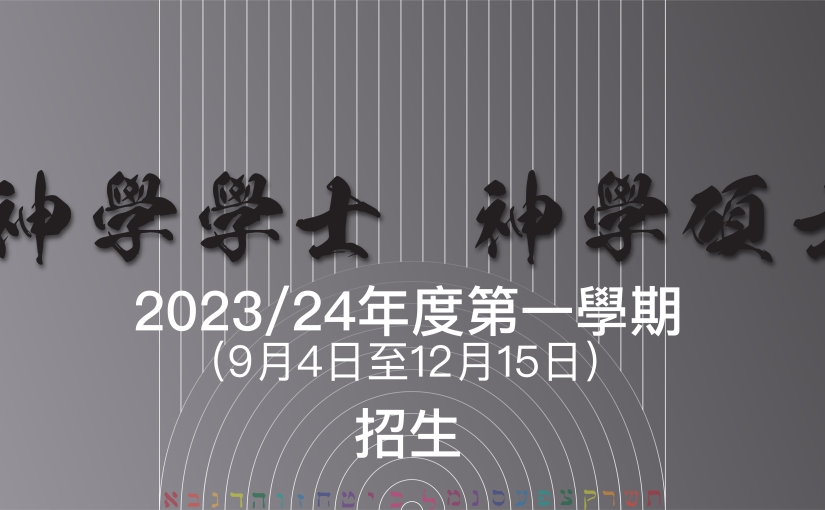In September, we begin a new semester at Ming Hua, where we will have another opportunity to explore the fascinating task of doing theology in a complex and ever-changing world. This task requires at the very least an examination of how our own encounter with God is shaped by our own contexts as well as the challenges, opportunities, and potentialities this creates.
Subjects at Ming Hua require both students and lecturers to be engaged in theology or ‘God-talk’ not as an abstract, difficult, and impractical subject, but rather as something integral to the Christian life, for theology is something that all Christians must do.
The moment we talk about God in some way, we are doing theology. The moment we begin to think about the bigger questions of life and death, when we search for meaning in our lives, or when we reflect on our own sense of morality, or why something might be right or wrong, we are doing theology. At the heart of most of these questions is our sense of ‘God’, and what God might or might not be and how we encounter God in the midst of our big questions.
As Christians, we are doing theology all the time because we are engaging with God and with each other in almost every waking moment of our lives. The God we worship is a personal God who desires a relationship with us, a God who speaks and to who we are compelled to respond. A God who is also Triune, expressed as Father, Son and Holy Spirit, a God who is expressed and encountered in communal and relational terms.
Theology is talk about and reflection upon the God we encounter in relationship. This is not an optional extra for a Christian, but rather something we must do, by virtue of being a Christian in the first place. Being in relationship to God and to each other is essential to Christian faith and is expressed in the commandments to love God and to love our neighbours (Mark 12: 30-31; Matthew 22: 37-40).
One of the great advantages of living in such a multicultural and diverse city as Hong Kong is that we are always encountering people with different experiences, from different backgrounds, and in different life situations. As people who talk about God, theologians are human beings, from a myriad of different situations and contexts. These situations and contexts shape who we are and how we think about God. The theology that we do is deeply influenced by our own life situations and cultural contexts, meaning that all theological reflection, wherever it is done, is deeply contextual.
So, when we come together to share and reflect theologically wherever we may be, it is always a coming together of different contexts and different perspectives. The God that we worship is a God who is amazingly rich and dynamic, God speaks to people across cultural contexts and boundaries and the response is from people who are diverse, yet also one in the Church, in the body of Christ. The way that we talk about God then, is at once universal, in that we share in the body of Christ as one people, and yet particular, in that we respond to God in different contexts and situations. We are one but we are also diverse, our life situations and experiences are not the same, so our theological response to God, our God-talk, will reflect this.
However, theological diversity is not something to fear, rather it is something to embrace. As we share our God-talk together as Christians we quickly realise that we have much to learn from each other which enriches our own experience of God. When as Christians we realise that we are doing theology all the time, and when we grasp that we can learn from others, then the boundaries of what we know about God and about ourselves can be widened. Our experiences of God can be enriched; they may even be challenged, for in this encounter we may realise the limitations of our own experiences. It is when we are open to the experiences of others, we can learn more about who we are and what we want to say in our own God-talk.
Theology, then, is far from being an abstract, impractical, or irrelevant subject, but rather one that is essential for understanding what being a Christian is really about. It is where we can engage in dialogue about the things that really matter in life, all the more important when living in such a complex city as Hong Kong, with all the many other preoccupations or temptations vying for our attention. Theology helps us to think and to question critically what is really important in our lives. It helps us to engage deeply with God and with others whose different contexts and experiences only enrich the process. It is also where we seek to understand more about the God who walks with us in all aspects of our life journey, a journey where we seek to understand more about who God is and why God matters.
These are some of the themes and questions that we will be exploring in our new semester at Ming Hua in September. So please join us for a lively, profound and exciting learning experience relevant to life in Hong Kong and beyond. We look forward to meeting you…
See here for more information on Ming Hua’s Bachelor of Theology and Master of Theology programmes.

